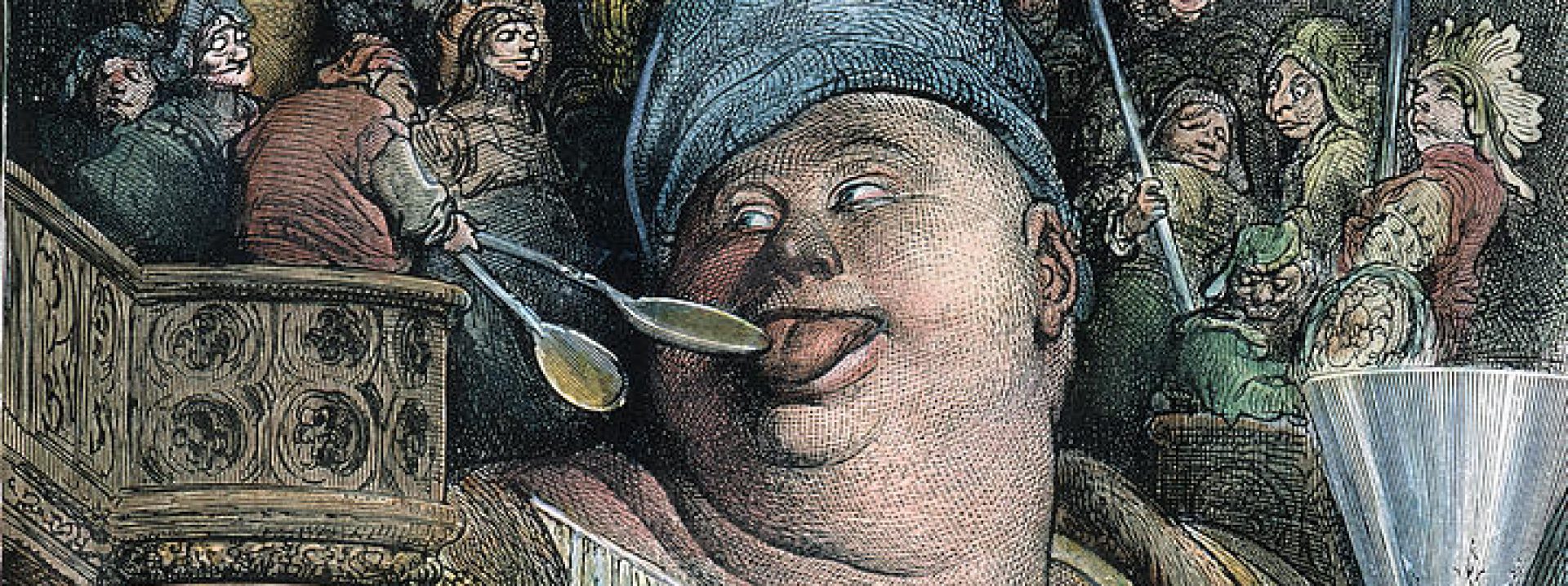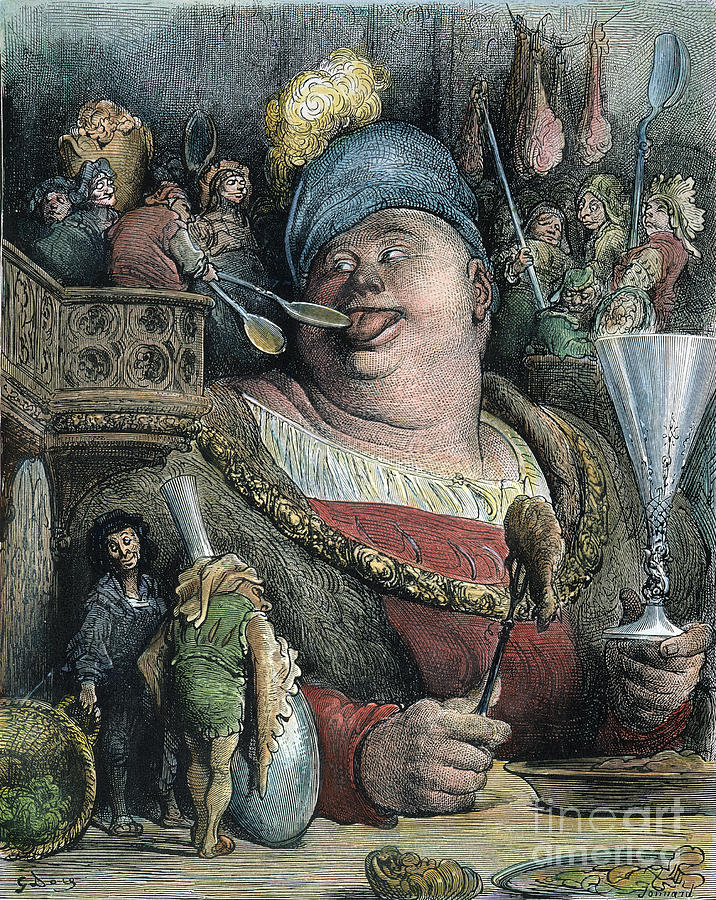Might finick with this later, but for now it’s done!
Any analysis of Aristophanic comedy needs to grapple with the precarious position of authorial authority and seriousness: does Aristophanes truly aim to teach the audience lessons (as he claims he does)? Do his plots reveal his true, earnest beliefs about the situations they center around? This question is even more critical when one considers Aristophanic comedy alongside the carnivalesque and grotesque of Bakhtin’s Rabelais.
For Bakhtin, seriousness (and all its baggage) is incompatible with the carnivalesque. “No dogma, no authoritarianism, no narrow-minded seriousness can coexist with Rabelaisian images” (R&HS, 3). Assuming that Aristophanes can be read alongside Rabelais and Bakhtin’s analysis of carnivalesque phenomenon, what does one do with Clouds, Aristophanes’ perhaps most infamous comedy, which revolves around a place translators call “The Thinkery,” a school run by Socrates, and which pits one kind of philosophy against another? These are not ‘mock’ philosophies in the sense that their content is rooted in true, sober values: the Superior method’s argument is faithful to the gods, justice, and personal discipline while the Inferior method’s argument holds nothing sacred (literally) and tells the man it’s trying to convince to partake of its teachings that, with the Inferior, ease and leisure will be his by means of sneaky rhetoric. They are mock philosophies in the sense that they are personified in a comedy (with all its trappings), but their contents were and are established modes of living, the values of which were considered at length by philosophers such as Plato and, in all likelihood, the historical person of Socrates himself.
There are several problems that arise at different analytical distances from the text. In this reflection specifically, I wonder: by writing a play about the serious business of philosophy, how is Aristophanes situated on the spectrum of the carnivalesque? Clouds ends with its protagonist, who sent his son to learn there in the hopes that he would talk his way out of debt and any suits brought against him, burning the Thinkery to the ground—his son, having learned the Inferior method, manages to convincingly argue that it’s alright to hit your parents. Many have interpreted this to argue something about philosophy in general, though the something is contentious.
It’s useful to reiterate Bakhtin’s take on seriousness. Discussing “The Play in the Bower,” Bakhtin sums up (a portion of) the carnivalesque theme, namely “the right to be free from all that is official and consecrated” (Ibid., 257). The same play, he says, “contains no abstract, moralizing element” (Ibid., 262). It seems clear, or if not clear then sensical, that any moralizing element tends to falter into the realm of the consecrated for Bakhtin; philosophy, religion, and duty cannot sincerely prescribe the fundamental nature of good and bad in a carnivalesque pose. If Aristophanes is prescribing right behavior to the audience by the dangers of the Inferior method (one of many potential morals to the story), he joins the ranks of the sour-faced priest and the chastising philosopher in the guise of a fellow celebrant. (Of course, there are any number of qualifications I could make to that statement.) We are in particular danger of believing that Aristophanes does prescribe, in Clouds especially, because it seems so obvious that we’re being moralized-at—if the character of Socrates is ridiculous, and Socrates is a real philosophical persona, then, by his comic characterization, Aristophanes argues that the philosophical persona of Socrates is wrong. By writing a comic plot about agents who do moralize, there’s no corner of the story that couldn’t imply some criticism of some philosophy, and, since a lot of philosophy is to criticize philosophy, it’s easy to say that Aristophanes does seriously philosophize. Taken all together, it seems that Aristophanes the moralizer is patently uncarnivalesque—whether or not he does moralize is the subject of ongoing, likely irresolvable, debate.
There is one ‘argument’ that one could reconstruct from Clouds that does not disqualify it from the carnivalesque mood, though: an argument for the posture of folly, or, for Bakhtin, “the opposite of wisdom—inverted wisdom, inverted truth” (Ibid., 260). The ‘protagonist’ of Clouds, Strepsiades, is one such fool. So says Socrates as we return from the parabasis: “By Respiration, by Void, by Air, I’ve never seen a man so rustic anywhere, so inept, brainless, and forgetful, the sort who tries to learn a few dinky snippets and then forgets them before he’s learned them” (627-631). It’s through him that we experience the events of the play: we see the Thinkery for the first time with him, we meet Socrates for the first time with him, we meet the titular clouds with him, we see the results of his son’s Inferior education with him—as Bakhtin says of festival, we look at the world of Clouds with foolish eyes (R&HS, 260). Not every Aristophanes play stars such a fool; he is right for this play in particular. I think one could argue that Strepsiades, the rustic fool par excellence, exists as a value-laden (not to mention grotesque) but certainly not moralizing figure. By putting the fool at the center of a plot about heady philosophy, Aristophanes invites the audience to embody (sans footlights) foolish priorities, and to understand them as true priorities, even if they’re obviously very comic.


What an interesting argument! I really enjoyed this, especially because I read Clouds in my intro philosophy class (in English, obviously.) My impression of the whole play was that it was absolutely ridiculous; the father sending his son to learn these faulty arguments, the whole school is insane, and his final conclusions about beating your parents are absurd. It feels highly Rabelais-esque, especially compared to the debate in signs scene. The whole scene is silly, and there seems to be a criticism of philosophy and intellectualism as well, but in the same vein as Clouds, perhaps through a base/foolish character like Panurge, Rabelais is telling us these are some higher priorities. This feels less true in Rabelais for some reason, but I’m not sure why?
Both the topic and the argument you put forward are very interesting! I read Cloud for my interest right after Knights, and I was struck by the differences between the two plays regarding morality and intelligence. I was pretty sure Aristophanes thought of Socrates and his philosophy in a critical way, but I was not sure if he wanted to give a lesson since he did not try to point out the appropriate way of philosophizing. I also wondered if there is any correlation or boundary between stupidity and low morality. The stupidity and low morality I saw in the protagonist seemed to play a role in each other; if anyone of them changed, the protagonist might not go to such an end. When we compare the protagonist with his son, his son looks “wiser” than his father, but at the same time morally inferior. The comic context and atmosphere somewhat blur such correlation and boundary, making it difficult for us to directly extract Aristophanes ’views on morality and intelligence.
Overall the argument is really interesting. I don’t know much about Clouds but your argument makes me think about how Aristophanes uses seriousness and how that intersects in Bahktin’s world of the carnivalesque. I haven’t read Clouds but I thank you for your analysis questioning its relevance in Bahtin’s world.